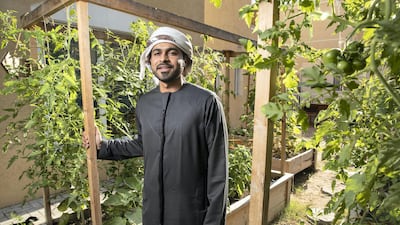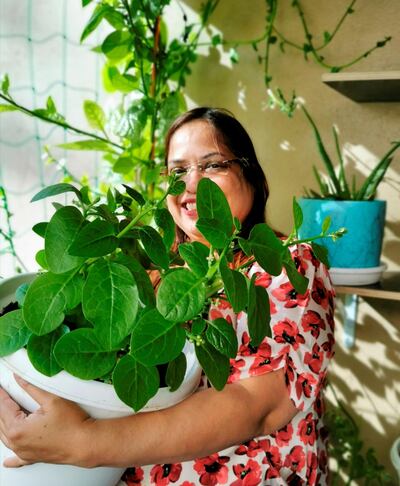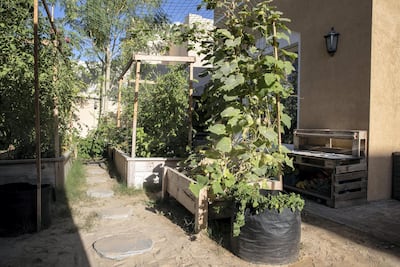Along with home chefs and TikTok dancers, the coronavirus pandemic spurred the rise of a UAE community some experts say is the need of the hour: gardeners growing their own food.
Using everything from living-room spaces to balconies in high-rises, many in the community say their passion has made them more aware not only of the foods they consume, but also of the wider environmental impact of the supply chain.
Gardening kits by Local Roots
"In the UAE, most of our food is imported, almost 90 per cent, which is crazy. Imagine facing a situation where the supply chain stops. We will be left with nothing," says Mohammed Al Dhuhouri, who founded Local Roots UAE in October 2019. The company encourages sustainable and organic local food production by providing consultation and gardening kits to anyone keen to start growing their own food at home.
Al Dhuhouri is an Emirati geologist who works as an environmental specialist at the Ministry of Climate Change and Environment. He says he started his company after he saw a growing interest. "People are realising whatever they put on their plates affects their health. And we wanted to encourage this trend, and provide the right tools and knowledge," he says.
A balcony full of vegetables
Dubai resident Nirmala D'Souza discovered the joys of producing her own food during restrictions on movement last year. "We weren't meeting anybody then and spending so much time in front of our screens, so I wanted a diversion," she says. "I started with chilli and once I saw it flourishing, I decided to do more research online and began growing."
D'Souza, who runs her own public relations company, has now converted her two balconies into gardens – one for vegetables, the other for flowers. On the former, she grows everything from coriander, fenugreek, spinach and taro to turmeric, cucumber and tomatoes. She says starting her own garden was one of the best decisions she's ever made.
“The feeling when you plant something and then harvest it, I don’t think anything else makes me this happy. My cucumber plant produced just one fruit, but the joy I felt was out of this world. I am now thinking about moving into a villa where I can have a bigger garden.”
Immunity-boosting microgreens
Jay Menorca, who works in marketing, says he’s saved a lot of money since he started his microgreens garden in July last year.
“A lot of microgreens are not easily available in the UAE and, where they are sold, they are expensive,” he says. “For example, when you buy wheatgrass at juice bars, one shot will cost you about Dh25. I bought a kilogram of seeds for Dh15 and can harvest it for a month.”
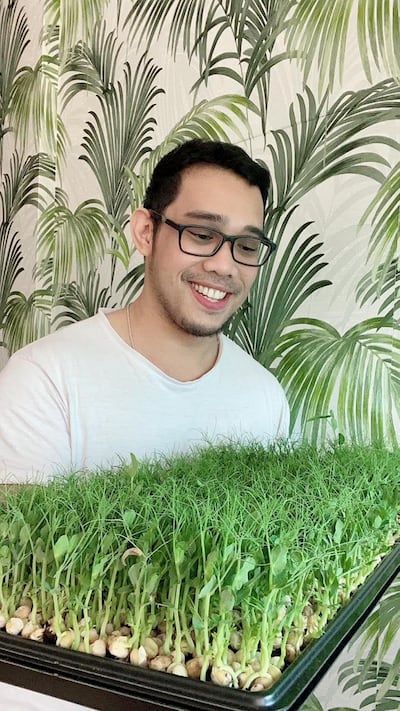
It was Menorca's housemate's Covid-19 diagnosis that led him to set up a microgreens garden in their living room. "When my friend tested positive, we researched superfoods that could help boost the immune system and found that microgreens are 10 times more nutrient compact than a lot of vegetables," he says.
Menorca built a deck with tools, including energy-efficient lighting, and seeds and trays ordered online. The seeds are ready to harvest within nine to 14 days, depending on the variety. He says he's been so successful with the project that he's helped to set up similar gardens for his friends.
"I am in the process of researching licensing and thinking about selling 'grow kits' for microgreens with all the seeds and tools as I've received so many inquiries.
Sell your own produce
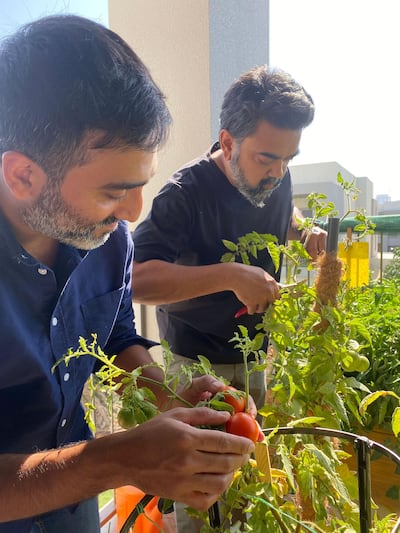
Other UAE residents have already turned their passion for gardening into successful businesses. Leonard Rego, who runs a technology and media company, last year decided to set up So We Grow, a company that helps people grow food on their balconies or in their back gardens. Rego and his cousin Nasser host training webinars to encourage people to produce their own food, and teach them how to become "market gardeners", so they can sell their produce.
The training sessions, held in Arabic and English, are gaining in popularity. Having started it April last year, the duo have more than 13,000 members on their Facebook page and more than 6,000 followers on Instagram. "Our mission is to let people know they don't have to rely on others for their sustenance. And to do it in a clean and healthy way, organically.
"The reason we started [the business] was because as soon as the pandemic hit, one of the fears was about food supply. Then there was a fear of contamination," says Rego. "Also there was little knowledge. People are so disconnected from nature in a city. During our webinars, someone asked which tree radishes grew on. People had no idea where their food was coming from."
Al Dhuhouri, who also hosts educational classes, says he's making it his mission to encourage more Emiratis to join him in the movement. "Many people think we live in a desert and we can't garden. We actually have one of the longest growing seasons on the planet, about seven months, compared to, say, Canada, which has just three months. So we are very lucky," says the father-of-three, who plans to set up an organic farm.
"Whenever you're connecting with nature and your hands are touching the soil, there is a sense of being grounded, and you feel peaceful. So you also benefit mentally and spiritually. And at the same time you produce high-quality food," he says.
“Also environmentally, you’re helping in cleaning all the bad chemicals that are circulating in the atmosphere. When we do gardening, we’re sequestering carbon and putting it back into the ground. So you are part of the solution. Eating healthy, producing food and helping the environment – it’s a win-win situation.”
There is also the monetary aspect. Rego grows more than 20 types of vegetables on his balcony and the garden of his Dubai Hills villa. He estimates that he and his family of four, including live-in house help, save up to Dh5,000 a year on grocery bills, thanks to his gardening.
That and the peace of mind it gives him is rewarding, he says. “I am working in three time zones right now and I don’t have a day off. The only time I feel grounded and present is when I’m gardening. It’s like developing a new superpower.”
